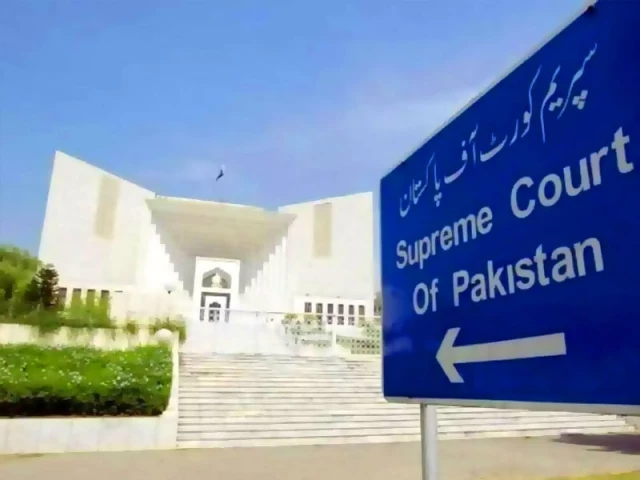A constitutional bench of the Supreme Court questioned on Wedensday whether the super tax could be imposed on already taxable income.
A five-member bench, headed by Justice Aminuddin Khan, was hearing a set of pleas challenging the imposition of super tax by the Pakistan Muslim League-Nawaz (PML-N) government in 2015.
“How can a super tax be imposed on a system that is already subject to taxation?” asked Justice Jamal Khan Mandokhail.
Petitioners’ counsel Farogh Naseem apprised the court that once income was assessed, a super tax or surcharge could apply. “For instance, if an account is opened in January 2021 and closed on December 31, 2021, a tax is still imposed six months later even though the taxpayer had already paid it.”
He added that the law made super tax applicable on income but did not describe it as an additional levy anywhere. “Section 4C of the Income Tax Ordinance — the provision that introduced the super tax in 2022 — does not mention an additional tax, and a taxpayer may choose to pay under Section 4 (general income tax) or Section 4C (super tax) of the Act,” he contended.
Read: SC questions super tax ‘burden on common man’
Justice Mandokhail pressed further: “Where does this option come from?” Naseem responded that it was a general principle that a taxpayer could choose one of two identical provisions under which to pay tax.
The judge likened the issue to criminal law. “It is like when two sections apply to one crime — the punishment will be awarded under the section carrying the lesser penalty.”
“Exactly — the same principle applies here as well. Double taxation cannot be imposed,” conceded Naseem.
Justice Mandokhail, pointing to Naseem’s political background, asked: “You have been a member of parliament. Tell us, who drafts this legislation?”
Read More: CB gears up for 26th Amendment case
“I did not draft Section 4C,” quipped Naseem.
The bench also examined deductions from provident funds, noting concerns over their impact on ordinary citizens and beneficiaries.
The hearing was adjourned until Thursday, with Naseem due to continue his arguments.
The Supreme Court is racing to conclude the matter before October 7, when hearings on challenges to the 26th Constitutional Amendment are slated to begin. Justice Aminuddin Khan has emphasised the urgency of wrapping up arguments quickly.
Super Tax
The super tax is an additional levy on high-earning individuals, companies, and industries, largely aimed at big corporations. In the 2022–23 federal budget, the government imposed up to 10% super tax on major sectors, including cement, steel, sugar, oil and gas, fertiliser, banks, and textiles, citing the need to raise extra revenue for economic stabilisation.
Petitions challenging the levy have been filed before the top court by individuals and organisations.
At a previous hearing, the bench was apprised by the Federal Board of Revenue (FBR) that no one had challenged the Lahore High Court’s (LHC) verdict, upholding the legality of the super tax imposed under Section 4C of the Income Tax Ordinance, 2001, while reducing its rate from 10% to 4% for 16 sectors, including banking, and offering partial relief to petitioners.
Earlier this year, the apex court questioned whether the Centre could distribute super tax revenue to provinces, noting that while the levy has been extended since 2016, no funds had been utilised for the stated purpose.
FBR mounted a defence of Parliament’s powers. Counsel Hafiz Ehsan Khokhar maintained that while Section 14 of the Finance Act had seen its purpose altered, its substance remained intact.
He rejected claims of legislative overreach, citing the 63-A case, but Justice Mandokhail pressed whether Parliament could constitutionally pass a tax bill outside the annual budget cycle. Judges also flagged contradictions in the Islamabad High Court ruling that had partly struck down the levy.
The bench in a later hearing then turned to provident funds, with FBR counsel Asma Hameed arguing that partial relief had already been provided. Justice Hasan Azhar Rizvi warned that taxing Rs100 today could mean Rs550 lost for retirees decades later. Judges also asked how advance super tax could be calculated when profits were unknown.
Also Read: SC grills ‘windfall profit’ logic in super tax case
Earlier, on Sep 25, the Court voiced concern that the tax ultimately burdened ordinary citizens. “Whether it is a cement bag or an LNG shipment, the entire burden comes down on the common man,” observed Justice Muhammad Ali Mazhar.
Judges examined provident fund deductions and queried whether widows were among the ultimate beneficiaries. Counsel Asma Hameed argued that Sections 4C and 9 of the Ordinance should be read together, but the bench pressed why taxpayers were treated differently.
Previously, the bench scrutinised the government’s “windfall profits” logic. Justice Rizvi asked whether routine price increases — petrol rising from Rs150 to Rs200, or sugar by Rs10 — could be treated as extraordinary profits.
Counsel Ahmed Jamal Sukhera said the levy targeted only a few sectors and violated constitutional safeguards. Judges also noted that loss-making state enterprises such as PIA and Pakistan Steel Mills were inexplicably included in the super tax list.
The proceedings began on September 19, when broader questions of legislative procedure dominated. Justice Mandokhail asked whether parliamentarians genuinely debated taxes before approving them. Counsel for taxpayers argued that FBR’s role was only to collect taxes, not design policy, which should ideally involve experts. Justice Rizvi questioned whether lawmakers simply rubber-stamped bills without considering their impact.

